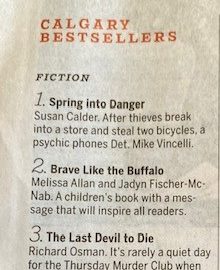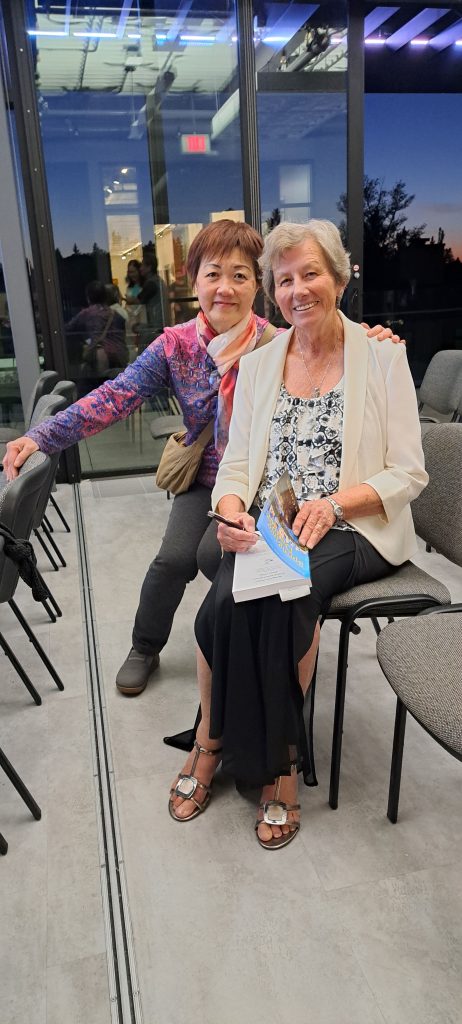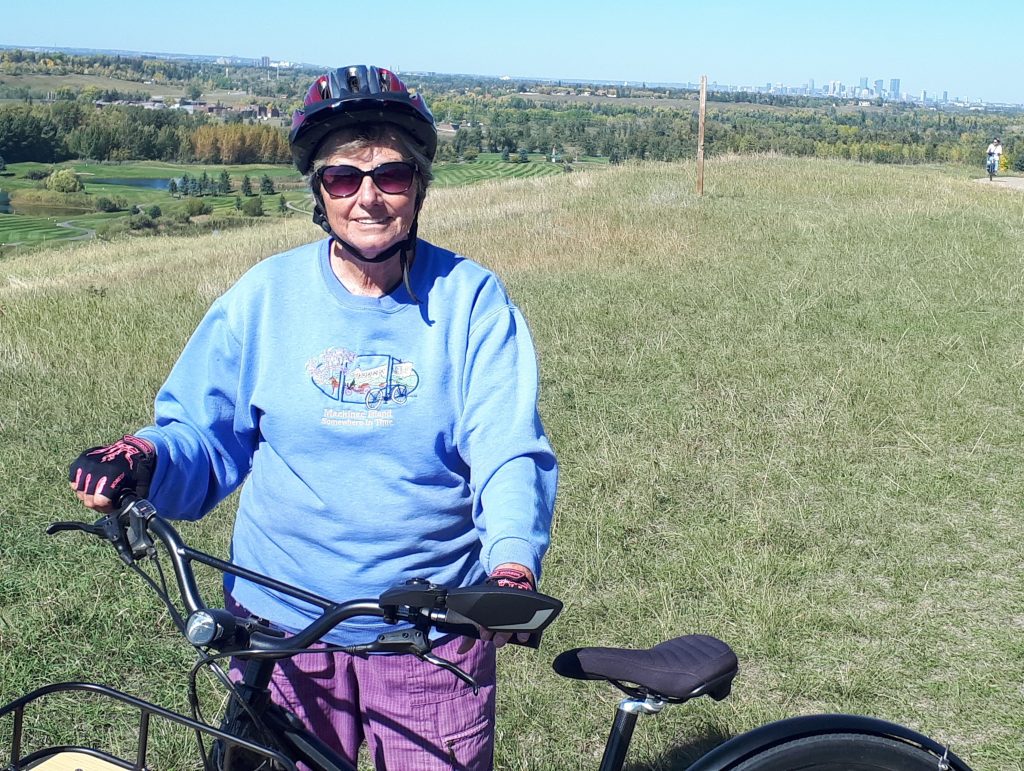Today on the BWL author blog I talk about my September book launch for my new novel, Spring Into Danger, and describe the planning that went into it. https://bwlauthors.blogspot.com/


Today on the BWL author blog I talk about my September book launch for my new novel, Spring Into Danger, and describe the planning that went into it. https://bwlauthors.blogspot.com/

Since I no longer subscribe to physical newspapers, a friend emailed me this clipping from yesterday’s Calgary Herald. Nice to see Spring Into Danger listed in actual print.
In the old days, I used to laminate newspaper clippings of my articles and previous appearances on Calgary’s Bestsellers List. Now I save them to my digital files.

Thanks to a great turnout at my book launch, my novel, Spring Into Danger, hit #1 on today’s Calgary Herald Bestsellers List. Here I am on the list in pretty good company.
CALGARY BESTSELLERS
Calgary Herald
Compiled from information from Owl’s Nest Books and Shelf Life Books.
30 Sep 2023
FICTION 1. Spring into Danger
Susan Calder. After thieves break into a store and steal two bicycles, a psychic phones Det. Mike Vincelli.
2. Brave Like the Buffalo
Melissa Allan and Jadyn Fischer-mcnab. A children’s book with a message that will inspire all readers.
3. The Last Devil to Die
Richard Osman. It’s rarely a quiet day for the Thursday Murder Club when shocking news reaches them — an old friend has been killed.
4. Lady Tan’s Circle of Women
Lisa See. The latest historical novel from See, inspired by the true story of a female doctor from 15th-century China.
5. Fourth Wing
Rebecca Yarros. Friends, enemies, lovers. Everyone at Basgiath War College has an agenda.
6. The Covenant of Water
Abraham Verghese. A shimmering evocation of a bygone India.
7. Never Whistle at Night: An Indigenous Dark Fiction Anthology
Shane Hawk and Theodore C. Van Alst Jr. (editors). Many Indigenous people believe whistling at night can cause evil spirits to appear.
8. Yellowface
R F Kuang. White lies. Dark humour. Deadly consequences.
9. Tom Lake
Ann Patchett. Patchett once again proves herself one of America’s finest writers.
10. Lessons in Chemistry
Bonnie Garmus. Elizabeth Zott is a scientist who becomes the star of a beloved TV cooking show.
NON FICTION 1. The PDT Cocktail Book: The Complete Bartenders Guide From the Celebrated Speakeasy
Jim Meehan and Chris Gall. Jim Meehan, PDT’S innovative operator and mixmaster, is revolutionizing bar books.
2. Run Towards the Danger: Confrontations with a Body of Memory
Sarah Polley. Oscar-nominated screenwriter, director and actor explores memory and the dialogue between her past and present. Canadian author.
3. The Home Cafe: Creative Recipes for Espresso, Matcha, Tea and Coffee Drinks
Asia Lui Chapa. With this classy curation of recipes, you’ll find endless ideas.
4. The Met Office: Pocket Cloud Book
Richard Hamblyn and the Met Office. This book provides you with all the information you need to identify different kinds of clouds and the weather that may be on its way.
5. Alberta Wildlife: A Folding Pocket Guide to Familiar Animals
James Kavanagh. Covers 140 of the most common and familiar animals you are likely to encounter.
6. Bugs & Slugs, 2nd Edition: A Folding Pocket Guide to Familiar North American Invertebrates
James Kavanagh. This guide highlights over 140 familiar species of insects, spiders and invertebrates.
7. Killers of the Flower Moon: The Osage Murders and the Birth of the FBI
David Grann. A twisting, haunting true-life murder mystery about one of the most monstrous crimes in American history.
8. The 48 Laws of Power
Robert Greene. Every law here has an interest in total domination.
9. How the World Really Works: The Science Behind How We Got Here and Where We’re Going
Vaclav Smil. An essential analysis of the modern science and technology that makes our 21st-century lives possible.
10. Fire Weather: The Making of a Beast
John Vaillant. A riveting journey through the intertwined histories of North America’s oil industry and the birth of climate science. Canadian author

I really enjoyed my book launch on Thursday evening at cSpace Marda Loop. Fifty people attended and seemed to be having fun. The weather was lovely. Many guests stepped outside to the deck for views of the city. I was too busy greeting people, getting ready for my presentation, and signing books.
Here’s a photo of me signing a book for my hiking club friend Jennifer. Note the post sunset light through the floor-to-ceiling window behind us.


My book launch for Spring Into Danger is tonight at cSpace King Edward Marda Loop. I think I have everything prepared and will have lots of stuff to bring up to the 4th floor Treehouse — food, drinks, disposable dishes, my computer for the PowerPoint presentation, door prizes, and more. Books will be the heaviest item, since I’ll be supplying Owl’s Nest, the bookseller for the event.
It looks like we’ll be fortunate with the weather. After two overcast days, the sun is out. It won’t be summertime warm, but people will be able to step outside on the deck as well as catch views of the city and mountains through the Treehouse’s glass windows.
My husband Will and I are going early to get a parking spot in the lot since cSpace has another event going on that night. For those who come later, there will be plenty of free parking on the nearby streets.
I look forward to seeing friendly faces in the audience cheering on my new book.

Yesterday’s cool, cloudy weather made it a good day to stay home and work on my book launch presentation. I enjoy creating PowerPoint presentations. As I’ve done at past launches, I’ll show slides of locations that inspired my novel and read scenes related to each setting.
My first reading will be the novel’s opening scene, narrated by my protagonist, Paula Savard. The novel begins with Paula alone in her office building in Calgary’s historic Inglewood neighbourhood, pictured at the top of this post.
After my readings and talk, I’ll invite audience questions and answer them as best I can. Then comes a trivia quiz, which I spent this afternoon preparing. I did my best to find interesting questions that strike a balance between easy and hard. With luck I succeeded and people will find the game fun and informative.
I look forward to tomorrow evening with readers and friends at cSpace Marda Loop.
Thursday, September 21, 2023, 7:00-8:30 p.m.
The Treehouse, 4th Floor cSPACE Marda Loop, 1721 29th Avenue SW
Calgary, Alberta
RSVP Owl’s Nest Bookstore email: contact@owlsnestbooks.com or phone 403-287-9557

At Bouchercon San Diego in early September, I met Nancy Brashear at an evening event. She said she’d driven from San Clemente to the convention with her husband, who wasn’t attending Bouchercon. He’d brought his e-bike and had discovered interesting bike paths in the city. That morning he’d taken his bike on the ferry to Coronado island. Even though I was thoroughly enjoying the convention, as an ardent e-biker I was a tad jealous.
The next day I was surprised and pleased to see Nancy and her husband at my Author Spotlight at Bouchercon. I set up my presentation materials while our husbands chatted about e-biking. After my talk, Nancy asked if I’d be interested in participating in her blog. She regularly interviews authors and creates a super post. We got in touch after I came home from California. Here’s the post she did about me: https://www.nancybrashear.com/e-bike-and-pandemic-inspire-author-susan-calders-new-mystery-spring-into-danger/
Nancy says she’s coming to Calgary Bouchercon in 2026 and if she lived in Calgary, she’d love to come to my book launch.
Thursday, September 21, 2023, 7:00-8:30 p.m.
cSPACE Marda Loop, 1721 29th Avenue SW
Calgary, Alberta

With my book launch three days away, I’ll rerun my September BWL Blog Post – Biking Inspired my Mystery Novel. I’ll touch on aspects of this at the launch. Here’s the original post:
In April 2020, my husband Will and I got e-bikes for an activity to do during Calgary’s shutdown for the COVID-19 pandemic. We’d enjoyed regular biking all our lives, but I’d grown tired of struggling up streets in my foothills home city and walking my bike up the steeper roads.
The previous year I’d tried out an e-bike at a mountain festival and was awed by its instant power and the ease of pedaling up the base of a ski hill. Will and I considered upgrading to e-bikes then but didn’t get around to it. Now, with a summer of limited options looming ahead, we checked out bikes at several local stores and settled on a small store close to our home.
On our second visit I asked the owner/manager why his store was open when most retail outlets were closed for the pandemic.
“Bikes are considered essential,” he said, with a tone of pride or surprise. “We’re transportation.”
I used that line in my new novel, Spring Into Danger.
That spring 2020 I was busy finishing the third book in my Paula Savard Mystery Series and starting to mull ideas for the fourth. Since Paula is an insurance adjuster, her next case would come from her insurance work. Ten Days in Summer (book # 2) involved a building fire with a suspicious death. Book # 3, Winter’s Rage, developed from a hit-and-run collision that killed a woman. A theft case seemed the likely next adventure for Paula. How about a break and enter at a bicycle store?
Our bike purchases led to several follow-up trips to the store. My front basket kept popping its screws and was eventually recalled for safety reasons. My spring-loaded seat came off whenever I grabbed it to lift the bike. Okay, I probably shouldn’t be lifting the bike that way, but it’s a habit.
The store owner gave me a regular seat and ordered a replacement spring-loaded one. Each time we phoned or went to the store to enquire about the order’s progress, he’d tell us about delays in the supply chain due to COVID protocols at the Vancouver port and the demand for bicycles causing backlogs in orders. Everyone was out walking or biking that shutdown summer. We witnessed the shrinking bicycle stock in the store. The owner told us people now had to wait months for e-bikes.
In hindsight I wonder if I enjoyed those store visits as an oasis of normalcy in the midst of the pandemic shutdown. Grocery stores — about my only other in-person shopping — often had lineups. This bike store didn’t. At the grocery store checkout, customers waited on floor markings spaced safely apart. Grocery shoppers crabbed about others blocking the aisles since we weren’t allowed to pass anyone. Nothing like that at the bike store. By summer most grocery store workers and customers wore masks. I saw no masks in our bike store; the bottle of hand sanitizer on the checkout counter went unused. Grocery shortages annoyed me. We already had our bikes and were only missing my spring-loaded seat. It never did arrive. After two years of waiting, we and the store owner gave up. I find my regular seat comfortable.
My story mulling continued. If I set my next novel during the COVID-19 shutdown, an open store, with casual protocols, would give my sleuth Paula a chance to do much of her work on the claim in-person. Having characters meet face-to-face is generally better than phone calls for drama in story scenes, since more can be shown through body language. For the same reason, in-person would be better than having Paula meet story characters on online platforms, which would become her new work method when COVID-19 hit. The book could still feature plenty of Skype and Zoom calls to give a flavour of the times.
I started writing the novel in fall 2021. So much had changed since the pandemic start that I felt a strange nostalgia for those first months, when COVID was new and frightening and most of us had no clue what lay ahead. I wanted to process that early experience and decided to set the story in April 2020, when the shutdown was in full force. The novel starts with Paula taking on a new claim — a break and enter at a bicycle store that raises questions. Through her investigations, Paula navigates COVID-19 restrictions, which impact the characters and plot in so many ways that the whole story would change if I removed the pandemic.
Now we’re into a post-COVID world — sort of. Will and I are still biking, although we’ve done less each year as other activities reopen. Our biking got off a late start this spring thanks to holidays in the UK and Ottawa. In addition, Will’s e-bike developed serious mechanical problems, which required more visits to our favourite bicycle store.

Hard to believe my book launch is only five days away. I’m finding it hard to focus on preparing for the event in the midst of Calgary’s burst of summer weather. Wednesday I went hiking in our beautiful Kananaskis mountains south of the city. Today I went to another part Kananaskis for a short hike and our hiking club’s annual highway cleanup. It’s always disappointing to find so little garbage by the roadside. Tomorrow I’m off for a bike ride in Banff on the Bow Valley Parkway, which is closed to motor vehicles this month. But Sunday, despite the forecast sunshine and warm temperatures, I will have to get down to work.
The launch party for Spring Into Summer will take place Thursday, September 21, 2023, 7:00-8:30 p.m. cSPACE Marda Loop, 1721 29th Avenue SW, Calgary, Alberta.

Now I have less than a week to prepare for my book launch on Thursday, September 21, 2023, 7:00-8:30 p.m. cSPACE Marda Loop, 1721 29th Avenue SW, Calgary, Alberta. There’s still lots for me to do, but I couldn’t resist an afternoon bike ride in our beautiful early fall weather. Today Will and I did one of our favourite biking loops, from our home to Douglasdale Ridge, then to Fish Creek Ridge and back. We enjoyed views of the Bow River, the mountains, Fish Creek, and the Calgary skyline.
